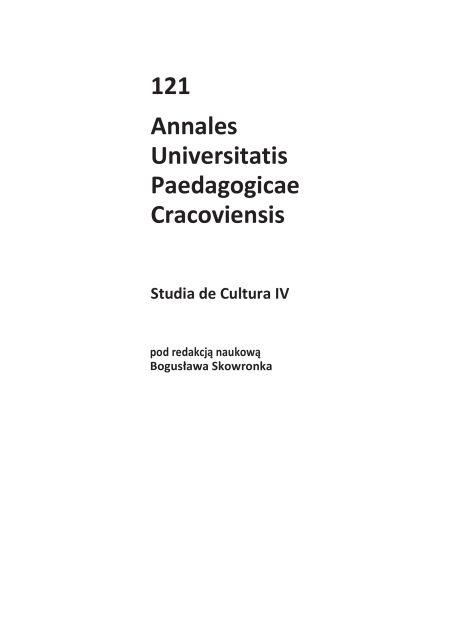Abstract
Vulgar surfer or a few words about the network profanity
There has been a common belief that an Internet language is full of vulgarism. The level of interpersonal culture in communication has been lowering, especially in functional aspect of language. Moreover, vulgarization of speech is getting forward, which is being noticed in many different communicational situations in the global network. In the Internet, vulgarisms usually appear in different than traditional meanings and they also play different functions. They can be written with the use of symbols available on a keyboard, euphemism or graphical elements. Acronyms and emoticons are also elements of language that are part of the web communication. It is also noticeable that the range of occurrence of vulgar words is getting wider and the feeling of vulgarity is getting weaker and weaker. In certain circles of users there can be seen even desemantization of vulgarisms that are used as interlude or substitute for many more semantically rich precise words. There has been popularization of colloquial elements leading to neutralization of expressivisms and replacing them with vulgarisms that are used to express mostly negative, angry and aggressive feelings. The analysis of the forms mentioned above underlines present deliberation.
References
Becela J., Gruszczyński W., Polszczyzna na czatach, „Studia Medioznawcze” 2003, z. 3 (13).
View in Google Scholar
Biernacka-Ligęza I., Wulgaryzmy a łamanie normy kulturowej, w: Mowa rozświetlona myślą. Świadomość normatywno-stylistyczna współczesnych Polaków, red. J. Miodek, Wrocław
View in Google Scholar
Bugajski M., Komunikowanie i komunikowanie się w mediach, w: Współczesne odmiany języka narodowego, red. K. Michalewski, Łódź 2004.
View in Google Scholar
Dunaj B., Przybylska R., Sikora K., Język na co dzień w: Polszczyzna 2000, Warszawa 2001.
View in Google Scholar
Encyklopedia językoznawstwa ogólnego, red. K. Polański, Wrocław 1999.
View in Google Scholar
Feliksiak M., Wulgaryzmy w życiu codziennym. Komunikat z badań 2007, www.cbos.pl
View in Google Scholar
Grochowski M., Słownik polskich przekleństw i wulgaryzmów, Warszawa 1995.
View in Google Scholar
Grybosiowa A., Destrukcja tradycyjnego, polskiego modelu grzeczności. Nowe formuły globalne, w: Przemiany języka na tle przemian współczesnej kultury, red. K. Ożóg, E. Oronowicz-Kida, Rzeszów 2006.
View in Google Scholar
Grybosiowa A., Język wtopiony w rzeczywistość, Katowice 2003.
View in Google Scholar
Grybosiowa A., Polaryzacja opinii o wulgaryzmach współczesnej polszczyzny, „Poradnik Językowy” 2006, z. 6.
View in Google Scholar
Kowalikowa J., Język bez etykiety, w: Język trzeciego tysiąclecia III, t. 1: Tendencje rozwojowe współczesnej polszczyzny, red. G. Szpila, Kraków 2005.
View in Google Scholar
Kowalikowa J., O wulgaryzmach w świadomości językowej młodzieży, „Poradnik Językowy” 2008.
View in Google Scholar
Kowalikowa J., Wulgaryzmy we współczesnej polszczyźnie, w: Język trzeciego tysiąclecia. Seria „Język a komunikacja” 1, red. G. Szpila, Kraków 2000.
View in Google Scholar
Kultura języka dziś, red. W. Pisarek, H. Zgółkowa, Poznań 1995.
View in Google Scholar
Mazur J., Tendencje rozwojowe współczesnego języka polskiego, „Annales UMCS” 2000, sectio FF.
View in Google Scholar
Mosiołek-Kłosińska K., Wulgaryzacja języka w mediach, w: Język w mediach masowych, red. J. Bralczyk, K. Mosiołek-Kłosińska, Warszawa 2000.
View in Google Scholar
Rejter A., Relacja język a emocje w perspektywie międzykulturowej, „Poradnik Językowy” 2008, z. 3.
View in Google Scholar
Szpunar M., Rozważania na temat komunikacji internetowej, w: Teksty kultury – oblicza komunikacji w XXI wieku, red. J. Mazur, M. Rzeszutko-Iwan, Lublin, 2006.
View in Google Scholar
Śledź A., Przerywnik czy wykrzyknik? Analiza składniowa i semantyczna pewnych użyć słów uważanych za wulgarne, „Poradnik Językowy” 2003, z. 9.
View in Google Scholar
Tadeusiewicz R., Społeczność Internetu, Warszawa 2002.
View in Google Scholar
Wciórka B., Wulgaryzmy w codziennym języku Polaków. Komunikat z badań 2001, www.cbos.pl
View in Google Scholar
Strony internetowe
View in Google Scholar
http://www.poprostuja.jor.pl/ [05.12.2011]
View in Google Scholar
http://fragarena.pl/user/131-webcoastcaster/ [05.12.2011]
View in Google Scholar
http://www.pudelek.pl/artykul/6777/doda_kurwa_odetne_ci_kutasa_kurwa_ta_yyy_zyletka [05.12.2011]
View in Google Scholar
http://cybergadanie.wordpress.com/ [05.12.2011]
View in Google Scholar
http://www.fejsik.pl/Chamstwo-szerzy-sie-na-Facebooku-a1672 [05.12.2011]
View in Google Scholar
http://polskidlapolakow.blox.pl/html/1310721,262146,21.html?325637 [05.12.2011]
View in Google Scholar
http://polskidlapolakow.blox.pl/2007/02/Co-jest-wulgaryzmem.html [05.12.2011]
View in Google Scholar
http://merkuriusz.id.uw.edu.pl/numer_5/swiat_mediow/Strefa+(ni)e-kulturalna,107.html [05.12.2011]
View in Google Scholar
http://www.milionporad.pl/porady/komputery_i_internet/643/Co_oznacza_xd_wtf_lol_rotfl_asap_fyi_afaik_i_inne_skroty [05.12.2011]
View in Google Scholar
http://www.spp.za.pl/ [05.12.2011]
View in Google Scholar

